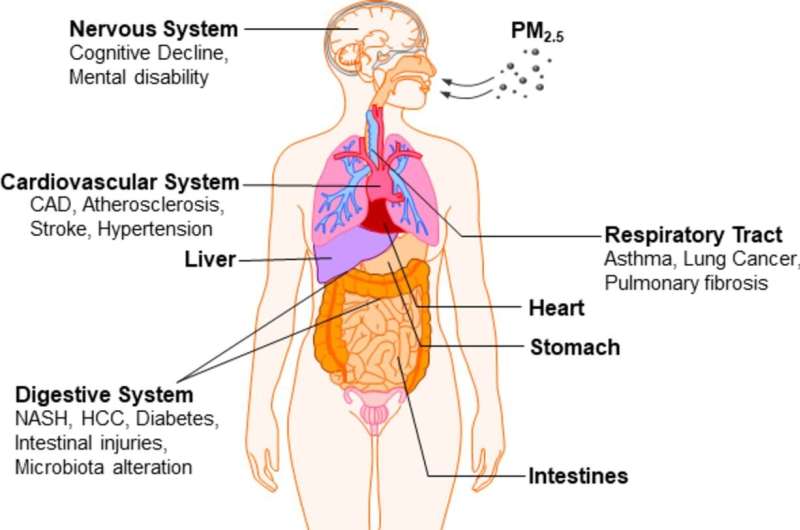This article has been reviewed according to Science X's editorial process and policies. Editors have highlighted the following attributes while ensuring the content's credibility:
fact-checked
proofread
How air pollution affects the digestive system

Fine air particles, less than 2.5 micrometers in diameter (PM2.5), are a major air pollutant linked to various health problems. These particles can travel deep into the lungs and even enter the bloodstream when inhaled. Recent research suggests a major health concern: PM2.5 exposure can also damage the digestive system, including the liver, pancreas, and intestines.
The work is published in the journal eGastroenterology.
This recent research has been focused on how PM2.5 exposure triggers stress responses within the digestive system's cells. These stress responses involve specialized subcellular structures within cells called organelles, such as the endoplasmic reticulum (ER), mitochondria, and lysosomes. When PM2.5 disrupts these organelles, it creates a chain reaction within the cells that can lead to inflammation and other harmful effects.
The liver, a major organ for detoxification and metabolism, is particularly susceptible to PM2.5 damage. Studies have shown that PM2.5 exposure can lead to a cascade of problems within the liver, including inflammation, stress responses, and damage to the organelles, and disrupted energy metabolism. These effects can contribute to the development of non-alcoholic fatty liver disease (NASH) and type 2 diabetes.
PM2.5 exposure does not stop at the liver. It can also harm the pancreas and intestines. Studies have linked PM2.5 to an increased risk of pancreatic impairment in people with diabetes, as well as damage to intestinal cells and an increase in their permeability. This increased permeability can lead to a variety of digestive issues.
While the recent research efforts provide valuable insights, key questions remain. Scientists are still working to understand how cells sense PM2.5 and how the stress response differs in various digestive organs. Additionally, they are investigating how PM2.5 exposure affects communication between different digestive organs, potentially impacting overall digestive function.
Finally, researchers are exploring whether dietary or pharmaceutical interventions can mitigate PM2.5 damage. Interestingly, some studies suggest that certain nutrients, like monounsaturated fatty acids and vitamins, may offer some protection against the harmful effects of PM2.5.
Air pollution is a complex issue with no easy solutions. While research continues mitigating PM2.5 exposure, the current understanding of its impact on the digestive system highlights the far-reaching consequences of air pollution on human health. It underscores the need for continued efforts to reduce air pollution levels and develop strategies to protect ourselves from its detrimental effects.
More information: Kezhong Zhang, Environmental PM2.5-triggered stress responses in digestive diseases, eGastroenterology (2024). DOI: 10.1136/egastro-2024-100063





















